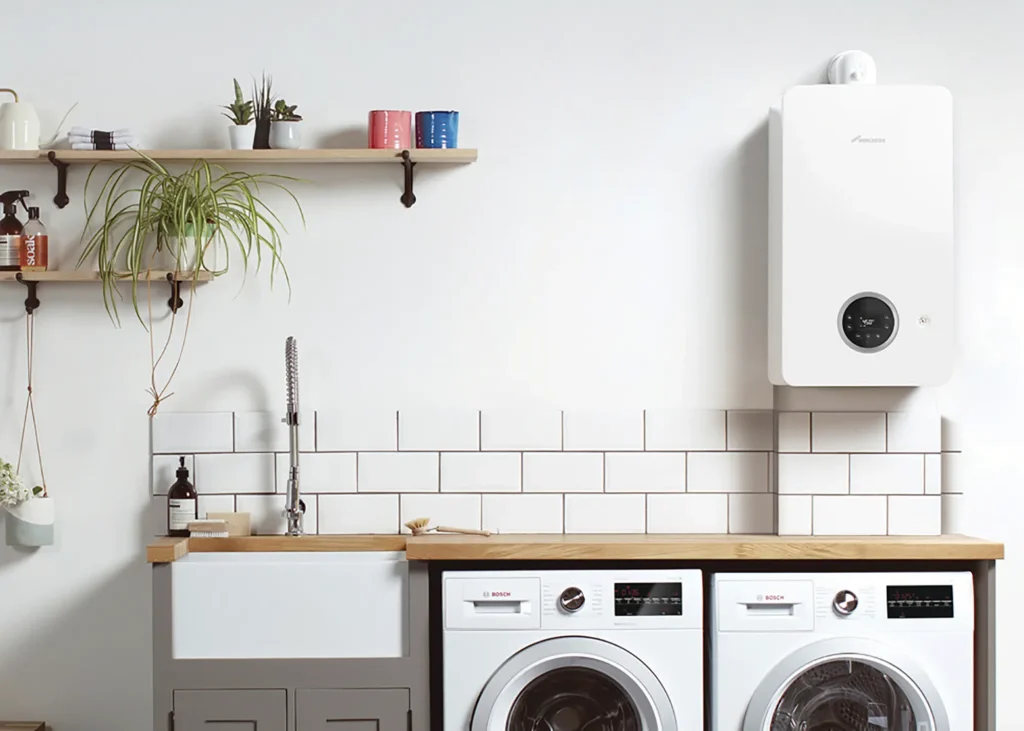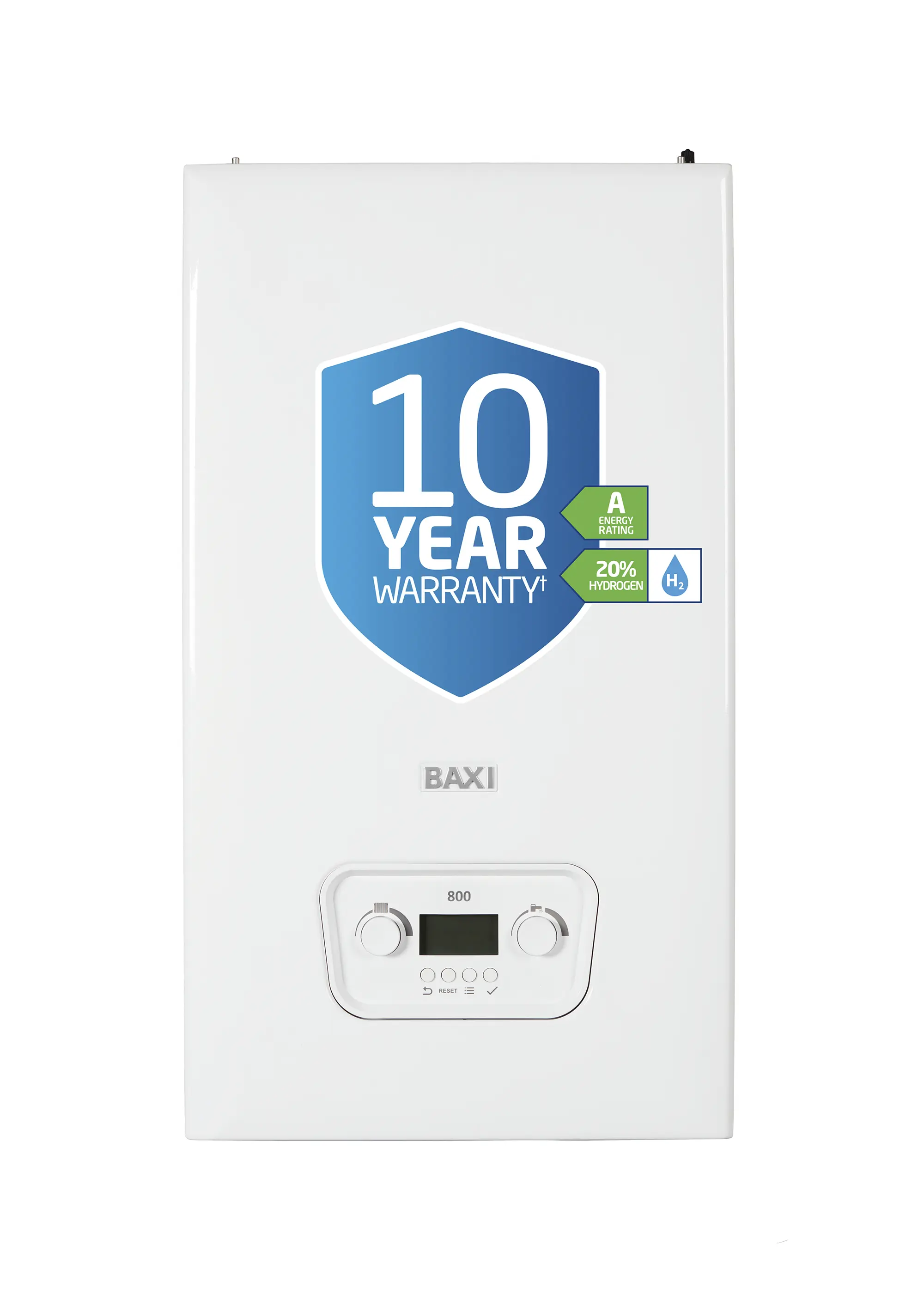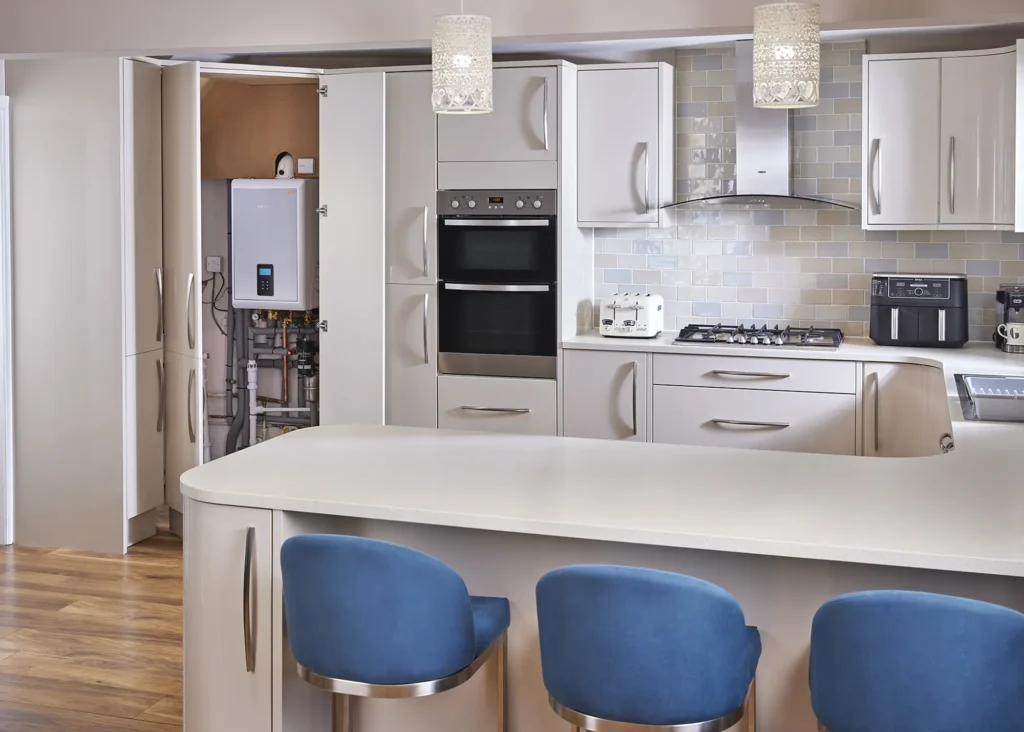
21st-22nd February 2026 - time to get your dream home started!
GET TWO FREE TICKETS HERE
21st-22nd February 2026 - time to get your dream home started!
GET TWO FREE TICKETS HEREThe conventional gas-fed boiler still functions as the primary heat source in most UK homes. This familiar, user-friendly appliance works with both radiator and underfloor heating systems, and it can be paired with intelligent controls to help maximise efficiency. Deciding on the right model for your property comes down to its size, how many people are living there and the building fabric’s thermal efficiency. However, self builders should be aware that, as of 2025, it may no longer be possible to fit a gas boiler in a new house.
The main options boil down to three types: regular, system and combination (combi). Each differs in how they provide domestic hot water for taps, showers and other essential fittings. “A regular boiler takes cold water from your mains supply and stores it in a tank, ready to be heated,” says Mark Wilkins, technologies and training director at Vaillant. “So, cold water is fed into the cylinder, where your boiler heats it and stores it until it’s needed.” Able to supply multiple outlets at once, regular boilers were once the go-to option for bigger homes – but they need space, requiring an expansion vessel in the loft.
System boilers are the modern choice for large homes with a high hot water demand. They also work on a stored water basis in order to supply multiple outlets simultaneously. “The cylinder can hold a good amount of hot water, so you don’t have to wait for it to warm up,” says Mark. System boilers take up less space than regular units overall, as the pump and expansion vessel are both contained together within the appliance itself. Plus, hot water is supplied at mains pressure.
find heating suppliers in Build It’s Directory

Worcester Bosch’s Greenstar 4000 is Quiet Mark certified as a low-noise appliance. Like all of their boilers, this model is able to run on a 20% hydrogen blend
Combi boilers represent the third option. This compact solution is ideal for homes where space is limited. “This type of tech doesn’t require a water tank or cylinder to deliver hot water. Instead, it simply heats up the required supply on demand, within seconds,” says Mark. The downside is that most combis can’t provide good pressure to multiple outlets at the same time. So, these systems are best for small homes. As a rule, if you have more than one bathroom, this may be a greater demand than a combi boiler can cater for.
Before placing your order for a gas boiler, it’s worth noting that significant changes to government legislation are poised to drastically influence the way we currently specify the primary heat source for central heating systems in new homes. As part of the Future Homes Standard, it’s proposed that new builds won’t be able to include fossil fuel boilers (whether gas, oil or LPG) from 2025. So, what does this mean for self builders in the UK and what are the alternatives?

The Baxi 800 combi 2 is compatible with the Baxi uSense smart control system, which allows you to operate it remotely via your phone or tablet
The Future Homes policy sets out the government’s intention to decarbonise the UK and achieve net zero by 2050. Its aim is that new housing built from 2025 onwards will produce 75-80% less carbon emissions than d under previous Building Regulations, achieved via the use of low carbon heat sources and high building fabric standards.
Crucially, the goal is for newly built homes to be zero-carbon ready. In late 2023, the (former) Prime Minister announced some aspects of the boiler ban would be delayed – but the Future Homes Standard consultation still states that zero-carbon ready means “no work will be necessary to allow [new houses] to achieve zero carbon emissions when the electricity grid is fully decarbonised. This means gas boilers, including hybrid and hydrogen-ready boilers, will not meet the proposed standards.” Whether this de-facto ban will go ahead for installations in new build homes remains to be seen.
CLOSER LOOK Gas boilers & SAP ratingsThe Standard Assessment Procedure (SAP) test is the means the government uses to determine the future energy performance of your home. It shows whether your house will comply with the energy and carbon requirements laid out by Building Regs. Even under current regs, it can be challenging to pass the assessment if you’re installing a gas boiler in a new build house. As part of the government’s ambitious carbon cutting goals, we know they intend to phase out natural gas boilers in new builds from 2025 . But what can you do to improve your home’s SAP rating in the meantime?
|
The short answer is not for some time, and if so, this is now not expected to take effect until 2035 at the earliest. However, homeowners are still being advised to move towards renewable solutions, such as air source heat pumps and ground source heat pumps, for instance, through incentives such as the Boiler Upgrade Scheme.
“For new build homes, it certainly makes sense to move towards renewables,” says Martin Passingham, department manager of products and training at Daikin. “As well as the efficiency gain, the benefit of not having to connect to the gas network can help generate significant savings.”

Navien’s NCB700 ON offers the benefits of a high-performance system boiler with the cylinder-less advantages of a compact combi. It’s 20% hydrogen-ready with an ErP A+ rating when used with Navien’s Smart Plus controller
If you do have an older boiler in your home, it will often make sense to upgrade to a more modern an energy efficient version – particularly if it’s more than 10-15 years old. You could also consider renewables, of course.
“My advice would be to start exploring the options now and consider the different alternatives that could suit your home and budget,” says Martin. “For an existing house, this may mean gradually spending some money upfront on eco home improvements before getting a heat pump. The drive to zero carbon is not just about increasing domestic heat pumps. It’s about making our homes more efficient so they keep the warmth inside.”

Vaillant’s ecoTEC plus combi boiler is smart home ready. The system achieves an ErP efficiency rating of A
Hydrogen-based heating is another route to zero carbon that the government is currently exploring. A hydrogen-ready appliance is designed to be a like-for-like swap for a conventional gas boiler. Manufactured by companies such as Baxi, Worcester Bosch and Viessman, systems that are hydrogen-blend ready can run on a gas mix that includes 20% or more hydrogen.
According to British Gas, the government is keen to bring hydrogen heating in quickly once the gas grid can deliver it, with the first phase seeing the introduction of a 20% hydrogen blend into the UK mains supply. This switch is unlikely to happen before 2028; and currently looks even further off, as pilot schemes have failed to get off the ground.
Comments are closed.